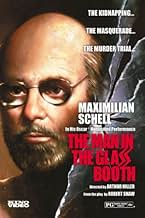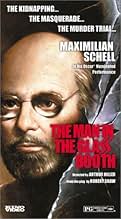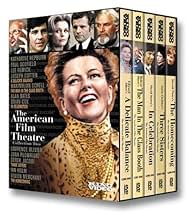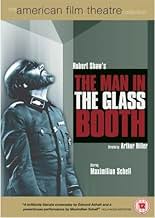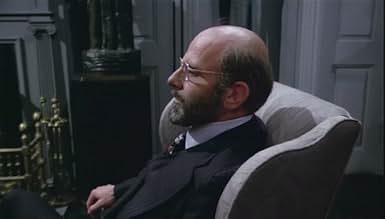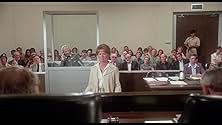VALUTAZIONE IMDb
7,0/10
1700
LA TUA VALUTAZIONE
Aggiungi una trama nella tua linguaMossad agents kidnap an American Jewish man, accuse him of being a fugitive Nazi war criminal and take him to Jerusalem to face trial for genocide.Mossad agents kidnap an American Jewish man, accuse him of being a fugitive Nazi war criminal and take him to Jerusalem to face trial for genocide.Mossad agents kidnap an American Jewish man, accuse him of being a fugitive Nazi war criminal and take him to Jerusalem to face trial for genocide.
- Regia
- Sceneggiatura
- Star
- Candidato a 1 Oscar
- 3 candidature totali
Leonidas Ossetynski
- Samuel Weinberg
- (as Leonidas Ossettynski)
Recensioni in evidenza
Maximilian Schell defines acting in this superlative effort which I have used in my classes when discussing the Holocaust. When you watch it, keep an open mind and don't be put off by sayings such as "What is a Christian but a Jew with an insurance policy? Rent it and watch it...I guarantee you will be impressed and troubled by the implications of the subject matter.
10zenda
This is my all-time favorite film. Maximilian Schell's Oscar-nominated performance completely dominates everything else on the screen. His long courtroom speeches are both disturbing and riveting. This is based on a book and play by Robert Shaw, who'll you'll probably remember as an actor from "The Sting", "Jaws" and "A Man for All Seasons". He disowned the movie version because of changes made. It has been too many years since I've seen the film, but I have re-read both book and play this month. I think a significant change to Col. Dorff's heritage was probably his objection. While I see his point, I think he overreacted. The film itself is a bit slow moving and everyone else is overpowered by Mr. Schell's breathtaking performance. But those flaws didn't kick in for me until I had seen the film a dozen or more times. It is a must see for Maximilian Schell's work- one of the greatest performances ever filmed.
The first half of "The Man in the Glass Booth" makes the viewer unsure of what to expect, as Maximilian Schell's protagonist - identified as a survivor of the concentration camps - orates about his experiences and desires. That's when everything changes. But even after this change, the protagonist maintains his attitude. So what's going to become of him, you ask.
The original source was Robert Shaw's 1967 novel, but it got adapted as a play in 1968, and the movie does feel more like a play. Quite a few things in the movie catch you off guard. In the end, it's a fine piece of work. A number of the scenes have a Hitchcock level of suspense. Definitely worth seeing.
The original source was Robert Shaw's 1967 novel, but it got adapted as a play in 1968, and the movie does feel more like a play. Quite a few things in the movie catch you off guard. In the end, it's a fine piece of work. A number of the scenes have a Hitchcock level of suspense. Definitely worth seeing.
10lousvr
A unique and terrific movie. Max Shell is the movie. One of his best acting performances. Complex plot calls for close focus and attention. It took quite some time to understand story due to its 'Cerebral layering' of just what is the goal of Shell's character. One very interesting note to movie is that it was based on a broadway play (which on opening had near riots by audiences due to misunderstanding of plot and closed shortly thereafter)and that was based on the original book, both written by none other then Robert Shaw (Capt Quint of 'Jaws' fame). Story is he was involved with the screenwriting or consulting, but in either case Shaw had his name removed in any connection with the movie. Why? Don't know. Unhappy with movie version?? The biggest trouble with this movie is that it is very, very difficult to find. Never shown on TV(where I originally saw on a PBS channel back in ~1979) or in most Video Catalogs. Find it.It's worth the effort. Best of luck.
As has been said in some of my reviews for the other twelve films making up the American Film Theatre series, the American Film Theatre series was an interesting and ambitious project but was also uneven. None of the thirteen films are terrible, one was close to though, but only three are great. 'The Man in the Glass Booth' was also seen as it was written by actor Robert Shaw and to see whether the Oscar nomination (the only performance in the American Film Theatre that was nominated for an Oscar) for Maximillian Schell was deserved.
My conclusions were that Schell's nomination was worthy, but it was a case of the performance being much better than the film itself (same with the subject matter being better than the film). Which left me intrigued but also a little cold. 'The Man in the Glass Booth' is not one of the worst of the American Film Theatre films, it's a lot better than 'Rhinoceros' and particularly 'Jaques Brel is Alive and Well and Living in Paris'. It is also not one of the best, it's no 'The Iceman Cometh', 'The Homecoming' or 'Butley'. Would put it somewhere bang in the middle.
Schell, the heart and soul of 'The Man in the Glass Booth', is extraordinary in the lead role. All the acting in fact is very good, though the rest of the cast are never on the same level as Schell. The second half is a lot better than the first half, with most of the second half being riveting and tension filled.
'The Man in the Glass Booth' is nicely filmed and the setting is simple and intimate without being too stifling. There is some thought-provoking and sincere writing.
However, 'The Man in the Glass Booth' had potential to be a lot better, especially considering the subject and the lead performance. The first half as indicated isn't as involving as the second. Parts are on the sluggish side while the writing is not as natural and can be mannered. While liking the second half a lot, the twist is somewhat contrived.
Furthermore the action was too confined and static. Arthur Hiller's direction has moments, but tended to be undistinguished and in need of more subtlety.
Concluding, definitely worth a one time watch but didn't blow me away. 6/10.
My conclusions were that Schell's nomination was worthy, but it was a case of the performance being much better than the film itself (same with the subject matter being better than the film). Which left me intrigued but also a little cold. 'The Man in the Glass Booth' is not one of the worst of the American Film Theatre films, it's a lot better than 'Rhinoceros' and particularly 'Jaques Brel is Alive and Well and Living in Paris'. It is also not one of the best, it's no 'The Iceman Cometh', 'The Homecoming' or 'Butley'. Would put it somewhere bang in the middle.
Schell, the heart and soul of 'The Man in the Glass Booth', is extraordinary in the lead role. All the acting in fact is very good, though the rest of the cast are never on the same level as Schell. The second half is a lot better than the first half, with most of the second half being riveting and tension filled.
'The Man in the Glass Booth' is nicely filmed and the setting is simple and intimate without being too stifling. There is some thought-provoking and sincere writing.
However, 'The Man in the Glass Booth' had potential to be a lot better, especially considering the subject and the lead performance. The first half as indicated isn't as involving as the second. Parts are on the sluggish side while the writing is not as natural and can be mannered. While liking the second half a lot, the twist is somewhat contrived.
Furthermore the action was too confined and static. Arthur Hiller's direction has moments, but tended to be undistinguished and in need of more subtlety.
Concluding, definitely worth a one time watch but didn't blow me away. 6/10.
Lo sapevi?
- QuizThis film was part of the American Film Theatre series, an experiment in marketing films (all based on plays) that would not otherwise have been able to get financing. Instead of being released to the general public, only people who purchased a subscription to the American Film Theatre series could buy tickets to any of its films. (Exceptions were made for movie critics and members of award-granting organizations, such as the American Academy of Motion Picture Arts and Sciences which awards the Oscars.) As a result, only a small number of people ever saw any of the films in their theatre runs. To enhance the value of the subscriptions, subscribers were guaranteed that the films would never be shown on television and never released to the general public. Legal issues connected with these guarantees kept this film from being available in any form for nearly 3 decades. It was finally released on DVD in 2003. The American Film Theatre experiment was abandoned after 2 years.
- BlooperThe Nazi Concentration Camps were run by the SS. The Wehrmacht (the regular German Army, also referred to as the Heer) was not directly involved in running the camps. Also The SS used it's own rank titles, so Dorf would have been known as a Standartenfuhrer instead of an Oberst (Colonel).
- Citazioni
Arthur Goldman: Passion play is a passion play.
- ConnessioniFeatured in Sunset Over Mulholland Drive (2019)
- Colonne sonoreEs war ein Edelweiss
(uncredited)
Written by Herms Niel
Sung by Lawrence Pressman and Maximilian Schell
I più visti
Accedi per valutare e creare un elenco di titoli salvati per ottenere consigli personalizzati
- How long is The Man in the Glass Booth?Powered by Alexa
Dettagli
- Data di uscita
- Paese di origine
- Lingue
- Celebre anche come
- El hombre de la cabina de cristal
- Luoghi delle riprese
- Aziende produttrici
- Vedi altri crediti dell’azienda su IMDbPro
Botteghino
- Budget
- 1.000.000 USD (previsto)
- Tempo di esecuzione1 ora 57 minuti
- Mix di suoni
- Proporzioni
- 1.85 : 1
Contribuisci a questa pagina
Suggerisci una modifica o aggiungi i contenuti mancanti

Divario superiore
By what name was The Man in the Glass Booth (1975) officially released in India in English?
Rispondi
